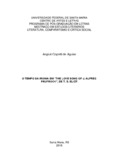| dc.creator | Aguiar, Angiuli Copetti de | |
| dc.date.accessioned | 2017-11-27T13:00:18Z | |
| dc.date.available | 2017-11-27T13:00:18Z | |
| dc.date.issued | 2016-12-13 | |
| dc.identifier.uri | http://repositorio.ufsm.br/handle/1/12076 | |
| dc.description.abstract | The works of the English poet T. S. Eliot (1888-1965) reveal a thematic and aesthetic interest in the subject of “time” as human experience, whether collective, as history, or subjective, as memory. His first poem, “The Love Song of J. Alfred Prufrock” (1916), is a pioneer experiment on the stream of consciousness technique through which are shown the complex mental processes of its character, Prufrock, in a complex fabric of times and logical chains. The temporal dimension was an object of analysis for many critics of the poem, most of whom relied on interpretations based on philosophical perspectives, dispensing, however, with another fundamental aspect of “The Love Song”: the irony. Thus we sought to reconcile in our study the two main aspects of the poem, time and irony, lessening the philosophical perspective in favor of an aesthetic and stylistic approach. For this purpose we proposed an analysis of the time in “The Love Song”, based on the the rhetorical study of Dubois et. al. (1960), and its interpretation following the insights of Søren Kierkegaard (2010; 2013) and Paul de Man (1986; 1996) concerning the relationship between irony and temporality. As a result, we observed that the kind of time depicted in the poem corresponds to the time that theoriticians define as characteristic of the structure of irony: a time in which the present is felt as tedious or discontinuous; the past, as absent of mystified; and the future, as postponed or as anxiety. | eng |
| dc.language | por | por |
| dc.publisher | Universidade Federal de Santa Maria | por |
| dc.rights | Attribution-NonCommercial-NoDerivatives 4.0 International | * |
| dc.rights.uri | http://creativecommons.org/licenses/by-nc-nd/4.0/ | * |
| dc.subject | T. S. Eliot | por |
| dc.subject | Tempo | por |
| dc.subject | Ironia | por |
| dc.subject | Poesia | por |
| dc.subject | Modernismo | por |
| dc.subject | Time | eng |
| dc.subject | Irony | eng |
| dc.subject | Poetry | eng |
| dc.subject | Modernism | eng |
| dc.title | O tempo da ironia em “The love song of J. Alfred Prufrock”, de T. S. Eliot | por |
| dc.title.alternative | The temporality of irony in “The love song of J. Alfred Prufrock”, by t. S. Eliot | eng |
| dc.type | Dissertação | por |
| dc.description.resumo | A obra do poeta inglês T. S. Eliot (1888-1965) reflete um interesse temático e estético sobre o “tempo” enquanto experiência humana, seja coletiva, como história, seja subjetiva, como memória. Seu primeiro poema publicado, “The Love Song of J. Alfred Prufrock” (1916), é um experimento pioneiro na técnica do fluxo de consciência, através do qual revelam-se processos mentais de seu protagonista, Prufrock, em uma complexa construção de tempos e encadeamentos lógicos. A dimensão temporal foi, de fato, objeto de análise de diversos críticos do poema, os quais, em sua maioria, recorreram a interpretações baseadas em perspectivas filosóficas, prescindindo, todavia, de outro aspecto fundamental do poema: a ironia. Portanto, procuramos conciliar, em nosso estudo, os dois aspectos que consideramos centrais em “The Love Song”, o tempo e a ironia, atenuando a perspectiva filosófica em favor de uma abordagem estética e estilística. Para tanto, propusemos uma análise do tempo em “The Love Song”, baseada no estudo retórico de Dubois et. al. (1960), e sua interpretação a partir das visões de Søren Kierkegaard (2010; 2013) e Paul de Man (1986; 1996) sobre a relação entre ironia e temporalidade. Ao fim, constatamos que o tempo predominante no poema corresponde ao que os teóricos definem como sendo característico da estrutura da ironia: um tempo no qual o presente é sentido como tedioso ou descontínuo; o passado, como inexistente ou ficcionado; e o futuro, como prorrogado ou como angústia. | por |
| dc.contributor.advisor1 | Pereira, Lawrence Flores | |
| dc.contributor.advisor1Lattes | http://lattes.cnpq.br/2329033954605102 | por |
| dc.contributor.referee1 | De Martini, Marcus | |
| dc.contributor.referee1Lattes | http://lattes.cnpq.br/6710912583881896 | por |
| dc.contributor.referee2 | Rubira, Luis Eduardo Xavier | |
| dc.contributor.referee2Lattes | http://lattes.cnpq.br/9798875695341483 | por |
| dc.creator.Lattes | http://lattes.cnpq.br/3199611175115853 | por |
| dc.publisher.country | Brasil | por |
| dc.publisher.department | Letras | por |
| dc.publisher.initials | UFSM | por |
| dc.publisher.program | Programa de Pós-Graduação em Letras | por |
| dc.subject.cnpq | CNPQ::LINGUISTICA, LETRAS E ARTES::LETRAS | por |
| dc.publisher.unidade | Centro de Artes e Letras | por |



